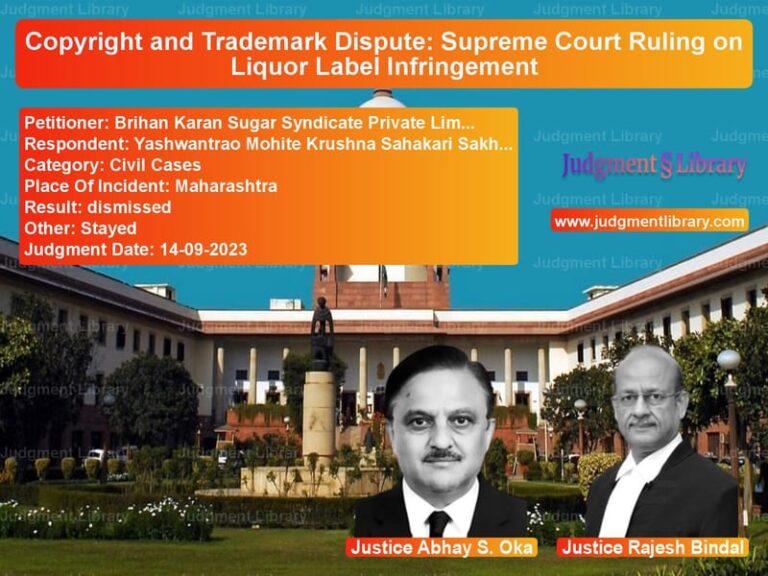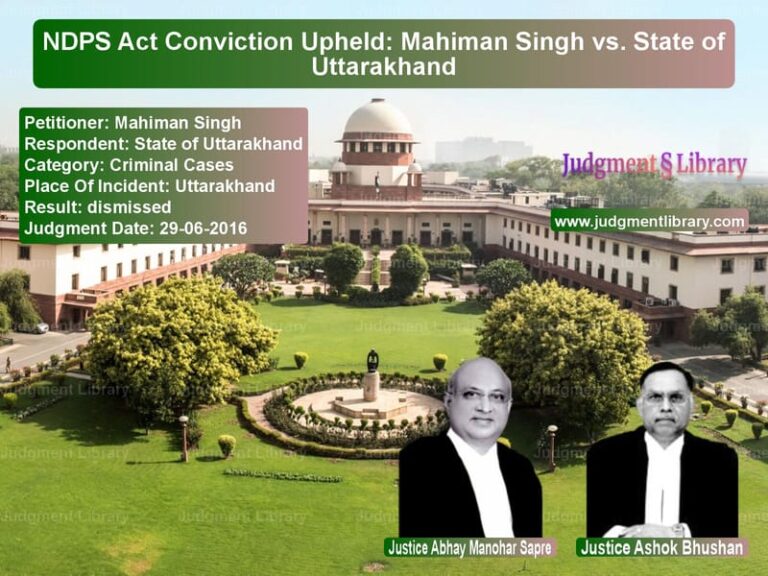Murder Conviction Upheld: Supreme Court Dismisses Appeals in Punjab Honor Killing Case
The Supreme Court of India, in the case of Pappu @ Hans Raj vs. State of Punjab, upheld the Punjab and Haryana High Court’s decision to convict the appellants under Section 302 of the Indian Penal Code (IPC) for the brutal murder of Amar Nath and his wife Rajji. The case revolved around an honor killing incident that took place on 27th September 2003, where the victims were attacked in broad daylight by multiple accused persons.
Background of the Case
On 27th September 2003, a buffalo calf belonging to the deceased, Amar Nath, entered the field of accused Makhan Ram. This seemingly trivial incident escalated into a fatal altercation when Makhan Ram allegedly beat the animal. When Rajji, the wife of Amar Nath, confronted him, she was also assaulted. Following this incident, Amar Nath and Rajji, along with complainant Sarabjit Kaur (PW-2), attempted to convene a panchayat to resolve the matter. However, before they could do so, they were ambushed by the accused, leading to their violent deaths.
Trial Court Conviction
The prosecution presented multiple eyewitness accounts and forensic evidence to establish the guilt of the accused. Based on this, the trial court convicted:
- Makhan Ram (A-1) – Sentenced to life imprisonment under Section 302 IPC.
- Daljit Kumar (A-4) – Sentenced to life imprisonment under Section 302 IPC.
- Pappu @ Hans Raj (A-6) – Sentenced to life imprisonment under Section 302 IPC.
Three other accused, namely Ricky (A-2), Seebo (A-3), and Kulwinder Kaur (A-5), were acquitted due to insufficient evidence against them.
High Court Appeal
The convicted appellants challenged their conviction before the Punjab and Haryana High Court, arguing that the prosecution had failed to prove their guilt beyond a reasonable doubt. The High Court, however, dismissed their appeal and upheld the trial court’s verdict, reaffirming that the prosecution had established the accused’s involvement in the crime.
Arguments by the Appellants
- The accused contended that Pappu @ Hans Raj was not named in the FIR and had no motive against the deceased.
- It was argued that there was no direct evidence linking Pappu to the crime, and no weapons were recovered from him.
- The defense pointed out inconsistencies in eyewitness testimonies and claimed that the case was built on circumstantial evidence.
Arguments by the State (Respondent)
- The prosecution highlighted the testimonies of key witnesses, including Sarabjit Kaur (PW-2) and Ram Lubhaya (PW-5), who provided a detailed account of how the accused attacked the victims.
- Forensic reports confirmed the nature of injuries inflicted on Rajji, which included multiple deep incised wounds.
- The police investigation and recovery of weapons supported the prosecution’s case.
Supreme Court’s Observations
The Supreme Court, after thoroughly reviewing the evidence, upheld the concurrent findings of the trial court and the High Court. The Court noted:
- “The eye witnesses, namely, Sarabjit Kaur (PW-2) and Ram Lubhaya (PW-5), have stated about the overt acts of accused Pappu @ Hans Raj and Daljit Kumar.”
- “As per their evidence, the accused inflicted fatal injuries on the deceased with sharp-edged weapons, which is corroborated by the medical reports.”
- “The injuries inflicted clearly indicate the intention to kill, thereby justifying the conviction under Section 302 IPC.”
- “We do not find any good ground warranting interference with the concurrent findings of the courts below.”
Final Judgment
The Supreme Court dismissed the appeals, holding that there was no merit in the arguments presented by the accused. The conviction and life imprisonment sentences of Pappu @ Hans Raj and Daljit Kumar were upheld.
Implications of the Judgment
This ruling has far-reaching implications in criminal jurisprudence:
- Upholding Eyewitness Testimonies: The judgment reinforces the credibility of consistent and corroborated eyewitness statements.
- Preserving Judicial Consistency: The Supreme Court’s refusal to interfere with concurrent findings highlights the importance of maintaining judicial discipline.
- Emphasizing Deterrence: The ruling serves as a deterrent against honor killings and mob violence.
- Legal Precedent: This case sets a precedent for handling cases where minor disputes escalate into serious crimes.
Conclusion
The Supreme Court’s judgment in Pappu @ Hans Raj vs. State of Punjab sends a strong message that crimes committed under the pretext of personal vendettas will not be tolerated. The ruling underscores the significance of relying on solid evidence and ensuring that justice is served, particularly in cases involving violent crimes. This case reinforces the commitment of the judiciary to uphold the rule of law and protect citizens from unlawful aggression.
Petitioner Name: Pappu @ Hans Raj.Respondent Name: State of Punjab & Anr..Judgment By: Justice R. Banumathi, Justice Indira Banerjee.Place Of Incident: Punjab.Judgment Date: 03-10-2018.
Don’t miss out on the full details! Download the complete judgment in PDF format below and gain valuable insights instantly!
Download Judgment: Pappu @ Hans Raj vs State of Punjab & An Supreme Court of India Judgment Dated 03-10-2018.pdf
Direct Downlaod Judgment: Direct downlaod this Judgment
See all petitions in Murder Cases
See all petitions in Attempt to Murder Cases
See all petitions in Bail and Anticipatory Bail
See all petitions in Judgment by R. Banumathi
See all petitions in Judgment by Indira Banerjee
See all petitions in dismissed
See all petitions in supreme court of India judgments October 2018
See all petitions in 2018 judgments
See all posts in Criminal Cases Category
See all allowed petitions in Criminal Cases Category
See all Dismissed petitions in Criminal Cases Category
See all partially allowed petitions in Criminal Cases Category







